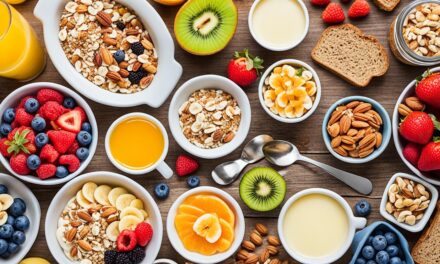Picture this: it’s late at night, you’re in your cozy pajamas, and you’re about to settle down for some well-deserved relaxation. But suddenly, your stomach rumbles, reminding you that you skipped dinner earlier in the evening. You’re faced with a dilemma – should you resist the temptation to snack and stick to your diet, or give in to those late-night cravings?
This scenario is all too familiar for many of us. Eating at night has long been a subject of debate when it comes to weight loss and maintaining a healthy diet. But what does the science say about late-night snacking and its impact on our overall health?
Research has delved into the relationship between eating at night and its effect on our bodies. Some studies suggest that eating late at night may contribute to weight gain, while others argue that it’s not the timing of our meals that matters, but the overall caloric intake for the day. So, what’s the truth behind late-night snacking?
The Relationship Between Eating Time and Weight Gain
Are your nighttime eating habits negatively impacting your weight loss goals? Research has shown that the timing of your meals, specifically eating later in the day or at night, may have a significant impact on weight gain and your body mass index (BMI). But before you give up your midnight snacks completely, let’s dive into the science behind late-night snacking and explore healthier alternatives.
When it comes to weight gain, several factors may contribute to the relationship between eating time and weight. Differences in metabolic rate, nutrient absorption, and insulin sensitivity have been suggested as possible explanations for the increased weight gain associated with nighttime eating habits.
But here’s where things get interesting. While some studies suggest that eating a small, healthy snack before bed can actually benefit you, there is a lack of consensus on the overall impact of late-night snacking on weight management. Some research suggests that a small, healthy nighttime snack may promote improved sleep quality and reduce nighttime hunger. So, it’s not all bad news for those who enjoy a little nibble before hitting the hay!
Nonetheless, it’s essential to choose your late-night snacks wisely. Opt for healthy nighttime snacks that are low in calories but high in nutrients. Consider options like a handful of nuts, a slice of whole-grain toast with a nut butter spread, or a serving of Greek yogurt with fresh berries. These options can provide a satisfying treat while still supporting your weight loss goals.
The Impact of Nighttime Eating Habits on Weight Loss
| Benefits of Healthy Nighttime Snacks: | Risks of Unhealthy Late-Night Snacking: |
|---|---|
|
|
Remember, moderation is key. While a small, healthy nighttime snack can have potential benefits, it’s important to practice mindful eating and avoid excessive calorie intake. Listen to your body’s hunger cues and choose nutrient-rich options.
In summary, the relationship between eating time and weight gain is a complicated matter. While eating later in the day or at night may be associated with increased weight gain, the impact of late-night snacking on weight management is still not fully understood. However, choosing healthy nighttime snacks and practicing moderation can help support your weight loss journey while satisfying your cravings. So go ahead and enjoy a guilt-free late-night nibble!
The Role of Circadian Rhythm in Eating Patterns
The body’s internal clock, also known as the circadian rhythm, is more than just a pattern of sleep and wakefulness. It actually plays a significant role in regulating various physiological processes, including eating patterns. So, yes, your body has a natural timetable for when it wants to eat!
Research has shown that the timing of meals can have an impact on diet-induced thermogenesis – the fancy term for the process by which your body burns calories to digest and metabolize food. Just like your body has peak performance times for physical activity, it also experiences variations in metabolism throughout the day.
Recent studies have even found a link between eating time and something called postprandial lipemia – the increase in blood triglyceride levels that occurs after a meal. In plain English, this means that the way your body processes fat changes depending on when you eat. Fascinating, right?
So, why does all of this matter? Well, these findings suggest that aligning your eating patterns with your body’s natural circadian rhythm may actually have metabolic benefits. It’s like giving your body a boost in efficiency and effectiveness!
Now, you might be wondering how you can sync your meals with your circadian rhythm. One approach is to try to eat your larger, more energy-dense meals earlier in the day, when your body’s metabolism is generally higher. This way, you give your body ample time to digest and utilize those calories before bedtime.
On the flip side, having a lighter and more balanced dinner can help prevent going to bed on a full stomach, which can disrupt your sleep. Plus, nobody likes waking up feeling like they’re carrying around a brick in their stomach!
Of course, individual preferences and lifestyle factors play a role in how you structure your eating patterns. But it’s worth considering how your body’s natural circadian rhythm may influence your metabolism and overall health.
So, next time you catch yourself reaching for that late-night snack, think about whether it aligns with your body’s internal clock. By embracing the rhythm of nature, you might just find yourself feeling more energized, focused, and in tune with your body’s needs.
The Impact of Late-Night Eating on Health
Late-night eating can have various effects on your health. If you’re a shift worker or regularly work nights, your eating and sleeping patterns may be all over the place. Unfortunately, this can put you at a higher risk of developing metabolic syndrome, a not-so-friendly cluster of conditions that includes insulin resistance, obesity, high blood pressure, and high cholesterol.
But wait, there’s more! The joys of night work don’t stop there. Sleep disruption is also a common side effect, which can lead to weight gain and other health issues. So not only are you battling a wonky schedule, but your overall well-being may be at stake as well.
Still not convinced to put down that late-night snack? Well, how about this: late-night eating has been linked to acid reflux and poor food choices. When you’re burning the midnight oil, it’s all too easy to grab a bag of high-calorie, unhealthy snacks instead of opting for something nutritious.
Remember, it’s not just the hour on the clock that matters; it’s the impact on your body. Make it a priority to consider these potential health risks when evaluating your late-night snacking habits. Your well-being is worth more than a bag of chips or a sugary treat.
The Not-So-Great Effects of Late-Night Eating
| Shift Work and Night Work | Metabolic Syndrome | Sleep Disruption |
|---|---|---|
| Can lead to irregular eating and sleeping patterns | Increases the risk of insulin resistance, obesity, high blood pressure, and high cholesterol | Contributes to weight gain and other health issues |
| Can have a negative impact on overall well-being |
So, whether you’re burning the midnight oil for work or just have a habit of late-night snacking, it’s important to recognize the potential harm it can do to your health. Getting your eating and sleeping patterns back on track and choosing healthier options can make a world of difference in your overall well-being.
Conclusion
So, you’re wondering if eating late at night can ruin your diet? Well, here’s the deal: the science is not crystal clear. While some studies suggest that late-night snacking may contribute to weight gain, others indicate that it’s the overall calorie intake that matters most. So, it’s not as simple as saying eating after a certain time will automatically sabotage your dieting efforts.
When it comes to dieting and eating late at night, it’s important to consider individual factors like your preferences and lifestyle. What works for one person may not work for another. But don’t despair! Making informed choices about your late-night snacking can still support your weight loss goals.
Instead of grabbing that bag of chips or reaching for sugary treats, why not opt for healthier nighttime snacks? Choose nutrient-dense options like a handful of nuts, a Greek yogurt, or a slice of whole-grain toast with avocado. These choices can satisfy your hunger and provide your body with beneficial nutrients.
Remember, it’s not just about when you eat, but also about what and how much you eat throughout the day. Strive for a well-balanced diet that includes a variety of fruits, vegetables, lean proteins, and whole grains. And don’t forget to listen to your body’s hunger and fullness cues, even late at night.
FAQ
Can eating at night ruin your diet?
How does eating late at night affect weight gain?
What is the role of circadian rhythm in eating patterns?
What are the health impacts of late-night eating?
What is the conclusion about dieting and eating late at night?
MORE SOURCES TO READ:
- https://www.sciencedaily.com/releases/2022/10/221021163559.htm
- https://www.ncbi.nlm.nih.gov/pmc/articles/PMC4425165/
- https://www.healthline.com/nutrition/what-time-should-you-stop-eating
![]()














Recent Comments